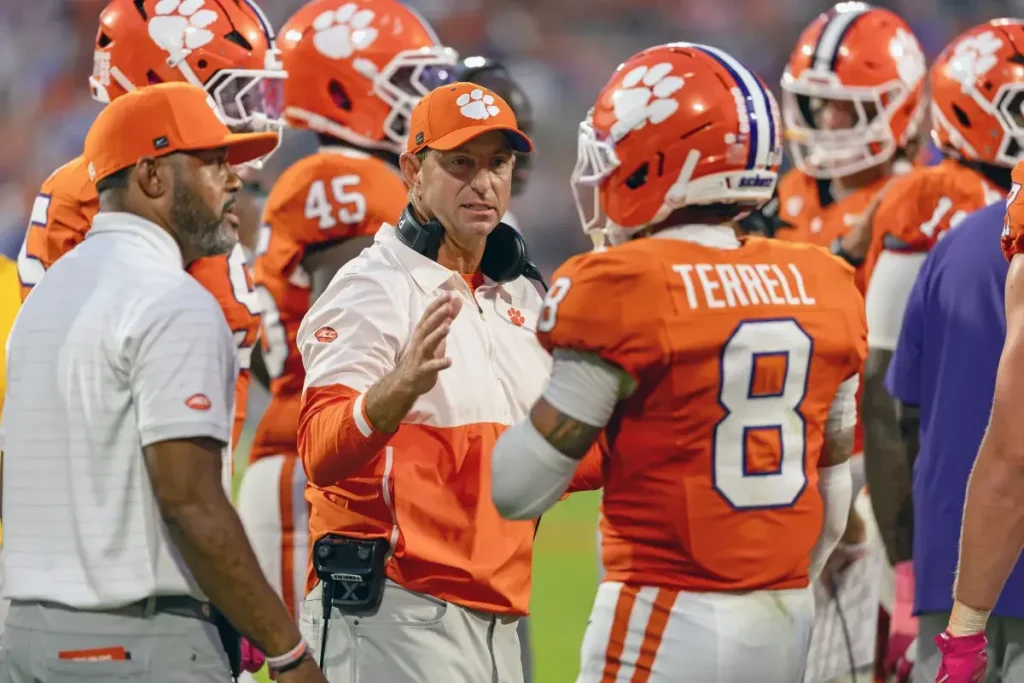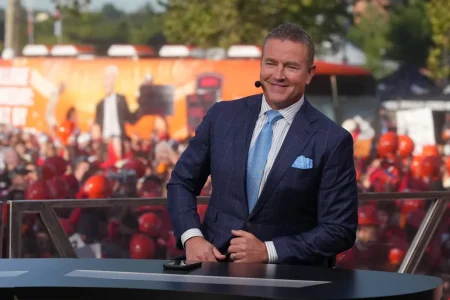Clemson Tigers: A Program at a Crossroads
The once-dominant Clemson Tigers find themselves in unfamiliar territory this season, stumbling to a disappointing 4-5 record that has raised questions about the direction of a program that was recently considered a perennial national championship contender. Head coach Dabo Swinney, who has led the Tigers to two national championships and multiple ACC titles during his tenure, now faces perhaps the greatest challenge of his coaching career as he navigates a season that has fallen well short of the lofty expectations set for Clemson football. Despite the struggles, industry insiders report that Swinney’s position remains secure – a combination of his extraordinary past success and a prohibitive $60 million buyout ensures he’ll continue to pace the sidelines at Death Valley for the foreseeable future.
A closer examination of Clemson’s decline reveals a coach who has seemingly struggled to adapt to college football’s rapidly changing landscape. Swinney has been notably resistant to embracing the transfer portal as a roster-building mechanism, though reports suggest his stance on NIL (Name, Image, and Likeness) compensation to attract blue-chip recruits has softened somewhat. This philosophical approach, once considered principled, now appears increasingly outdated as programs across the country leverage these modern recruitment tools to remain competitive. The Tigers’ losses to Georgia Tech, Syracuse, and Duke – games they likely would have won during their championship years – have highlighted the program’s vulnerability in this new era of college football, where roster flexibility and financial incentives have become crucial components of sustained success.
While some have speculated that Swinney might be better suited to one of the high-profile coaching vacancies at programs like Penn State, LSU, Florida, or Auburn, the veteran coach has consistently maintained his loyalty to Clemson and the ACC. His public statements indicate he expects to remain with the Tigers until the university decides otherwise – a scenario that seems highly unlikely given his historical success and the aforementioned financial considerations. This commitment to Clemson speaks to Swinney’s character and the deep roots he has established in the community, but it also means he must find solutions within the program’s current framework rather than seeking a fresh start elsewhere.
While Swinney’s job appears secure, the same cannot be said for his assistants. According to reporting from Pete Nakos of On3, significant staff changes are expected this offseason as the program attempts to address its mediocre performance. The numbers tell the story – Clemson currently ranks 10th in the ACC in total offense and 9th in total defense, statistics that would have been unthinkable during the program’s dominant run in the mid-to-late 2010s. These underwhelming rankings suggest systemic issues in both scheme and execution that cannot be ignored if the Tigers hope to return to national prominence. The struggles on both sides of the ball indicate that a comprehensive overhaul of the coaching staff may be necessary to inject new ideas and energy into a program that has grown stagnant.
The most likely candidates for replacement include offensive coordinator Garrett Riley, co-offensive coordinator Kyle Richardson, defensive coordinator Tom Allen, and associate head coach/co-defensive coordinator Nick Eason. This potential staff purge represents a significant shift for Swinney, who has historically valued continuity and has often promoted from within rather than seeking outside perspectives. The willingness to consider substantial changes to his coaching staff suggests that Swinney recognizes the severity of Clemson’s current situation and understands that maintaining the status quo is no longer viable. These difficult decisions will test Swinney’s leadership and could define the next chapter of his coaching career.
As Clemson looks toward the future, the program stands at a crossroads that will determine whether its recent struggles represent a temporary setback or the beginning of a more prolonged decline. The decisions made this offseason – particularly regarding staff changes and recruitment strategy – will shape the trajectory of Tigers football for years to come. For a fanbase accustomed to competing for championships, this period of uncertainty is undoubtedly frustrating, but it also presents an opportunity for renewal and reinvention. If Swinney can successfully blend his traditional values with a more progressive approach to program building, Clemson may yet reclaim its position among college football’s elite. However, failure to adapt could further erode the foundation of excellence that has defined the program throughout Swinney’s tenure, potentially signaling the end of an era in Clemson football history.















